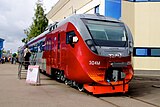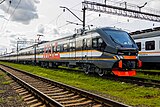Demikhovo Machinebuilding Plant
This article needs additional citations for verification. (December 2014) |
You can help expand this article with text translated from the corresponding article in Russian. (October 2016) Click [show] for important translation instructions.
|
 | |
Native name | Демиховский машиностроительный завод |
|---|---|
| Company type | Open joint-stock company |
| Industry | Rail vehicle machine building |
| Founded | 1935 |
| Headquarters | , |
Key people | Oleg Pavlov Director-General, Boris Yurievich Bogatyriov, gen. director |
| Products | Electric multiple unit |
Number of employees | 3,604 |
| Parent | Transmashholding |
| Website | www |
Demikhovo Machinebuilding Plant[1] or Demikhovsky Engineering Plant[2] (Russian: Демиховский машиностроительный завод, romanized: Demikhovsky mashinostroitelny zavod, abbreviated DMZ) is a major Russian rail vehicle manufacturerer. It is organised as anopen joint-stock company.
History[edit]


The site was a silk weaving factory originally owned by the Vetrov family and expropriated by the Soviet government.[3]
Since its inception in May 1935, the profile of Demikhov changed several times. There were activities in chemical engineering and the peat industry. But since 1992, the main products manufactured are electric multiple unit trains on 3000 V DC and 25 kV VAC at 50 Hz. During its life, Demikhov has produced seventeen different types of trains and produced over 3,000 examples, operated in Russia, Ukraine, Belarus and Kazakhstan.[1]
On the occasion of its 50th anniversary in 1985, the factory has been awarded the Order of the Red Banner of Labour.
In 1992, the Russian government decided to expand the production of suburban electric multiple units (EMU) at Demikhovo and substantially expanded the plant. In 1993, the first Russian fully formed EMU saw the light of day.[3]
The company became part of Transmashholding in accordance with the Decree of the Governor of Moscow Region Boris Gromov of 20 July 2001, submitted to the departmental submission to the Committee on Transport, Moscow region.[4]
In 2006 Demikhovsky produced and sold 571 trains of types ED4M, ED9M, and ED4MK). Various spare parts sold for nearly $40 million. In 2006 the company presented its new development, the ED4MKM.
In 2007 Demikhovsky produced and sold 630 electric trains of types ED4M, ED9M, and ED9MK.
In 2008 the electric intermodal passenger transport train ED4MKM-AERO was certified.
Product line[edit]
- ED2T Electric (Electric Demikhovsky, version 2): a series of Russian electric direct current, commercially available from 1993 to 1999
- ED9T (Electric Demikhovsky, 9th class): a series of alternating electric trainsets, produced since 1995 until 2000
- ED9M: the upgraded version of the electric trainsets ED9T, produced since 2000 until 2012
- ED9E: an upgrade with energy-efficient electrical equipment, produced since 2012 until 2016
- ED4 (Electric Demikhovsky, version 4): a series of Russian electric trainsets, produced since 1996 until 1998
- ED4M: the upgraded version of the electric trainsets ED4, produced since 1997 until 2016
- ED4MKU: the upgraded version of the electric trainsets ED4M, produced in 2005
- ED4MKM: the upgraded version of the electric trainsets ED4MKU, produced since 2006 until 2009
- EP2D: a series of Russian electric trainsets, produced since 2015
- EP2DM the upgraded version of the electric trainsets EP2D, produced since 2023
- EP3D: a series of alternating electric trainsets, produced since 2016
Gallery[edit]
-
EMU trainED4-0055
-
EMU train ED4M-0500
-
ED9M-0266 Aeroexpress
-
EMU train ED4MKM-AERO
-
EMU train ED9E-0029
-
EMU train EP2D
-
EMU train EP3D
-
EMU train EP2DM
References[edit]
- ^ a b "History of the plant". dmzavod.ru.
- ^ "Demikhovsky Engineering Plant". tmholding.ru.
- ^ a b "Our History". Demikhovo Machinebuilding Plant. Retrieved 2023-11-29.
- ^ "DMZ today" (Press release). Retrieved 3 October 2016.
External links[edit]
- Official website (in Russian) (in English)








